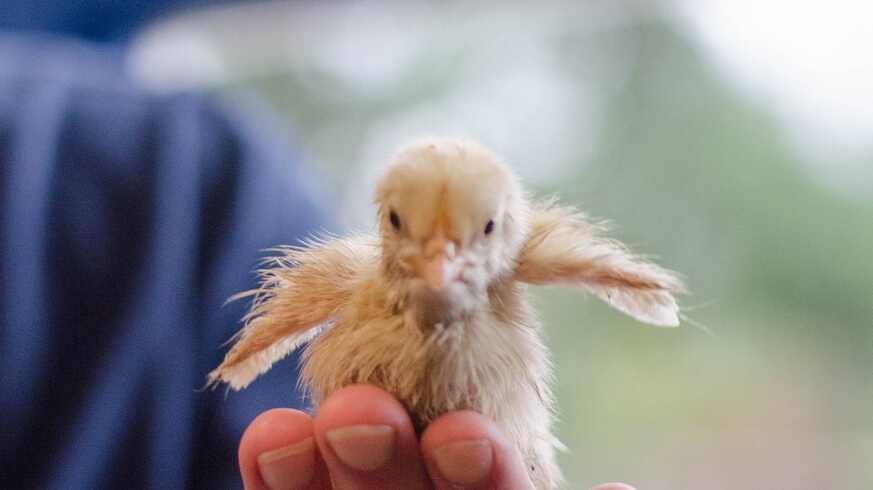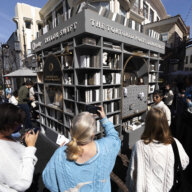The PSPCA says 800 baby chicks, the lone survivors out of a group of some 2,500, were discovered without food or proper shelter over the weekend in a vacant lot in Olney that their owner wanted to turn into a chicken farm.
But the PSPCA’s Humane Law Enforcement found the chicks’ owner didn’t even have permission to use the vacant lot on the 5500 block of Whitaker Avenue near Roosevelt Boulevard, where hundreds of chicks squawking for help led to multiple calls from concerned citizens.
“Finding agricultural animals in the city of Philadelphia is not unusual for us,” said PSPCA Director of Humane Law Enforcement Nicole Wilson. “However, the size of this was what was extraordinarily out of the norm for us. … Now, our big task ahead of us is finding placement for all these birds.”

A veteran humane law enforcement officer said they’d never seen a discovery of so many chickens. The PSPCA soon discovered the chicks belonged to someone who intended to create a chicken farm, but had none of the required equipment.
“After receiving calls from concerned citizens, our Humane Law Enforcement team responded quickly to the scene,” PSPCA Director of Humane Law Enforcement Nicole Wilson said in a statement. “There, we found hundreds of baby chicks had been left in an unsuitable empty lot across from a shopping center.”

PSPCA discovers unlicensed chicken-growing operation
The chicks’ owners showed up a few hours after the PSPCA arrived on the scene. He informed them that his plan was to take over the lot and start raising chicks for food resale. However, he the lot in question was owned by an adjoining business and its owner had not been contacted. The chick’s owner had not provided the chicks with housing, feeding or watering stations, the PSPCA said.
Furthermore, he admitted that in the past few days, while transporting and failing to house his chicks, he had lost more than 1,000 of them, Wilson said.

“The owner admitted to having chicks there for days and having numerous chicks lost through transportation and inadequate housing,” Wilson said in a statement. “The owner estimated that he had lost over a thousand chicks prior to the discovery of the birds.”
The roughly 800 surviving chicks were transported to the PSPCA’s Erie Avenue headquarters for veterinary care, and will be treated before being adopted out or transferred to a rescue. Criminal charges are pending further investigation.
While an ad hoc shelter was in place on the lot, it was made of tarp, wood, with a bit of chicken wire, Wilson said, and hardly sufficient to keep baby chicks at the temperature of 95 degrees they require in the early stages of life.
The chicks’ owner appeared to believe he was within his rights to set up the farm to raise chickens and begin selling them as food.
“He had done some research on occupying vacant lots, and that was the impetus behind this incident,” Wilson said. “His thought was that he would find a piece of land, lay claim to that piece of land, clean off the land, and then put up this make-shift structure. … You can’t quite imagine the thought process that makes someone think this was a good plan of action. He really thought he was going to start this small farming operation in the middle of the city.”
While chickens are technically not legal to be kept as pets, many in Philadelphia grow their own chickens in backyard coops. Some have successfully beat city fines for keeping a few chickens on site. But some businesses, like J&B Poultry in South Philadelphia, have been slapped with harsher fines and even criminal charges for animal cruelty at sites where live chickens and other animals are raised for slaughter.
Wilson pointed out that unlike residents raising backyard chickens for a steady source of eggs, raising chickens to sell as meat requires by law submitting to certain protocols.
“If you are selling an animal for use as food, you are obligated to be inspected,” she said. “I don’t really expect us starting to see a rash of these around the city.”
The PSPCA, a 100 percent donor-funded animal welfare organization, which recently partnered with Main Line Animal Rescue, asks anyone with information about this case, or other cases involving animal cruelty, to call Animal Cruelty Hotline at (866) 601-SPCA. Tips can be left anonymously.




























